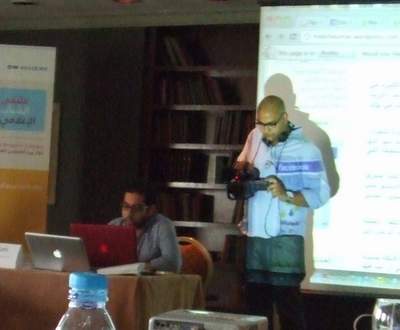... newer stories
Mittwoch, 25. Mai 2011
yms: Twitter
urmila, 02:34h
Almost all of the participants have twitter accounts. And many of them twitter during the whole day. I have to admit twitter for me is still a new technology, I neither write nor read. And I can think of scenarios were synchronous twittering is important. So, for example, there will be protests on the Tahrir Place on Friday. I understand that twittering is a good way of mobilising and spreading news during the protests. But why is anybody interested in live comments from our summit? Nobody can join, the information could also be spread later. Why twittering from the conference? I have read some of the tweets during the sessions and did not find an answer to my questions. I also do not get the point of just quoting one phrase from a talk. In this form decontextualised they do not make much sense for me. Writing and reading the tweets would take my concentration away from what is being said. And I also have the feeling that information can be spread too quickly with the web community, before one is really thinking about whether this is secure for all those involved.
I know that this post can be read as a conservative rejection of a new technology. And there might be some truth in this, because it is a technology I do not use. But at the same time I claim that we have to think about when synchronity of reporting makes sense and when maybe it is not so important or even a bad idea. Only because we have a technology we do not have to use it for all purposes and all the time.
And I am still wondering what the tweet of one of the participants that she is hiding her anti-feminism as so many participants are talking about feminism is meant to do. Is it making a statement against feminism for the other participants, who can follow the tweets, and is thus the opposite of hiding? If so, why is there the claim of hiding? I obviously do not get it.
PS 29.11.11: Currently the next Young Media Summit is staged in Tunis. Since I was a participant at the last one and I know some of the participants of the current one, I am interested in what is happening there. Thus I once in a while check their tweets and the Facebook site. Unfortunately, my impression from above, however, gets confirmed. The tweets provide me with totally unsatisfying information. Lots of it is totally uninteresting to me (in particular the advertisment posts in between for yms) and what is interesting is far too brief to get an impression of what is happening. Thus I have still not progressed in understanding why one should tweet from such a conference and why one should read the tweets.
I know that this post can be read as a conservative rejection of a new technology. And there might be some truth in this, because it is a technology I do not use. But at the same time I claim that we have to think about when synchronity of reporting makes sense and when maybe it is not so important or even a bad idea. Only because we have a technology we do not have to use it for all purposes and all the time.
And I am still wondering what the tweet of one of the participants that she is hiding her anti-feminism as so many participants are talking about feminism is meant to do. Is it making a statement against feminism for the other participants, who can follow the tweets, and is thus the opposite of hiding? If so, why is there the claim of hiding? I obviously do not get it.
PS 29.11.11: Currently the next Young Media Summit is staged in Tunis. Since I was a participant at the last one and I know some of the participants of the current one, I am interested in what is happening there. Thus I once in a while check their tweets and the Facebook site. Unfortunately, my impression from above, however, gets confirmed. The tweets provide me with totally unsatisfying information. Lots of it is totally uninteresting to me (in particular the advertisment posts in between for yms) and what is interesting is far too brief to get an impression of what is happening. Thus I have still not progressed in understanding why one should tweet from such a conference and why one should read the tweets.
1 Kommentar in: youngmediasummit ... comment ... link
yms: First priority media coverage
urmila, 02:19h

There is a video journalist following out conference. He is there most of the time, standing just in front of the speaker in order to get a good footage, holding his camera next to my head, disturbing a discussion. For me this filming seems very invasive. I am fine that I am filmed, but I do not want the camera and the video journalist to be so dominant. I want to listen and discuss in this group -that is my first priority. For me the filming should be of lower priority. Does film coverage have to be so invasive? Is media coverage more important than the event itself?
0 Kommentare in: youngmediasummit ... comment ... link
yms: Classist
urmila, 02:13h
The venue of our conference is very posh. It is the Mariott Zamalek in Cairo. And the reason for choosing this place is also acceptable: there are both conference rooms and internet access for all. But it also represents the privileges we all have. We sit here in this posh place, all costs covered, our travel expenses covered as well and all (but one, whose passport was not valid for six months more) got visas. We sit in this room and almost all of us have a notebook/ netbook / Macbook in front of us. Many have smart phones. The habitus of most indicates being situated in the upper middle class or upper class.

I engage with one in a discussion about migrant (domestic) workers (because I am interested in migrants from South Asia to this region) and talk about our privileges and their marginalisations. She gets into a very defensive mode, arguing that the domestic workers are treated well (since they are trusted the kids) and they give wrong accusations about being mistreated by their employers. She adds that she is working hard for her income as well and is not rich. That she can afford a driver, her sister has a domestic servant for her kids, who comes along to London, were they have a flat, etc. just seems normal to them.
Also another claims not to be rich, just comfortable. She drives a good car, has a blackberry, a very upper class habitus and the impression that the poor are less educated and thus more religious/ conservative.
These people are active in supporting the Arab revolutions, women's rights, etc., they are nice people and do good things. But I have a feeling that they do not question their class privileges much (I do that also much too little), that they reproduce classist exclusions and I ask myself, what consequences it has when it is these people who not only raise their voices but are also heard. And what it means that we privileged meet and network. What exclusions are we reproducing together?

I engage with one in a discussion about migrant (domestic) workers (because I am interested in migrants from South Asia to this region) and talk about our privileges and their marginalisations. She gets into a very defensive mode, arguing that the domestic workers are treated well (since they are trusted the kids) and they give wrong accusations about being mistreated by their employers. She adds that she is working hard for her income as well and is not rich. That she can afford a driver, her sister has a domestic servant for her kids, who comes along to London, were they have a flat, etc. just seems normal to them.
Also another claims not to be rich, just comfortable. She drives a good car, has a blackberry, a very upper class habitus and the impression that the poor are less educated and thus more religious/ conservative.
These people are active in supporting the Arab revolutions, women's rights, etc., they are nice people and do good things. But I have a feeling that they do not question their class privileges much (I do that also much too little), that they reproduce classist exclusions and I ask myself, what consequences it has when it is these people who not only raise their voices but are also heard. And what it means that we privileged meet and network. What exclusions are we reproducing together?
2 Kommentare in: youngmediasummit ... comment ... link
yms: Heterogenous perspective
urmila, 02:00h
In Germany a rather simple image of the Arab world dominates. All are the same, Muslim, etc. That this is a wrong image is nothing very surprising. But I am really glad to have the opportunity to spend three days with 11 bloggers/ journalists from eight different Arab countries. Already the first day showed the different perspectives they have, their different involvement in political struggles and different approaches. As a gender studies scholar I am in particular fascinated by the different feminist approaches, which encompass both those who firmly believe in the dichotomy of women and men as well as heterosexuality to those who question heteronormativity and fight for the rights of the non-heteronormative. It was also interesting to see how two bloggers engaged in the struggle for women's rights in two different countries got into a rather fierce argument about what the right way is. To be precise one of them had the feeling (and I think she was right there) that her home country was taken as the place, which treats women particularly badly, and reacted by defending it (although I later got the experience that she is rather critical of her country). This debate could also have been initiated by a mainstream German, who is anti-muslim, and a woman from the Arab world - but it was among two Arab women.
I am learning lots and ask lots of questions.
I am learning lots and ask lots of questions.
0 Kommentare in: youngmediasummit ... comment ... link
Mittwoch, 25. Mai 2011
Thoughts on the young media summit
urmila, 01:50h
I will shift now to blog about the Young media summit (yms) in English, as this gives the other participants a chance that they can read my posts (our working language is English). My plan at the moment is to write some short blog on impressions from the first day. Since our programme is pretty full, there is little time to plan the blogging, so I will just write down without much composing.
0 Kommentare in: youngmediasummit ... comment ... link
Neue Eindrücke
urmila, 02:48h

Heute abend bin ich in Kairo zum Young Media Summit angekommen.
Mal sehen, was ich alles zu erzählen haben werde. Gerade habe ich das Gefühl, dass ich erstmal vorallem hinschauen und hinhören sollte - und erstmal gar nicht so viel sagen. Ich lerne dazu.
0 Kommentare in: youngmediasummit ... comment ... link
Sonntag, 22. Mai 2011
Nicht normal
urmila, 02:46h
Frankfurt/Main. Nach einem Vortrag von Judith Bulter und Gayatri Spivak gehe ich mit anderen zusammen auf dem Fußweg entlang. Uns entgegen kommt eine kleine Gruppe. Der Mann schon älter. Der gibt mir ein ordentliches Tackling gegen die Schulter. Ich drehe mich um und schreie ihn an. Er teilt mir mit, dass ich zu viel Platz eingenommen habe und nicht normal sei. Der verbale Schlagabtausch geht etwas weiter. Ich beschwere mich, dass er als älterer Mann eine junge Frau anrempelt. Seine Gruppe entfernt sich. Eine Kollegin aus unserer Gruppe geht hinterher und streitet weiter mit ihnen. Später erzählt sie mir, dass er mich für einen 16jährigen männlichen Teenager gehalten hat. Und dass die Kollegin (sie ist groß und beeindruckend) das Gefühl hatte, dass er auf sie körperlich losgehen wollte.
Soviel zum Thema Gender, Pädagogik und Gewalt. Vorträge alleine reichen nicht, ab und zu braucht es auch praktische Erfahrung.
Und vielen Dank an die Kollegin für die Unterstützung!
Soviel zum Thema Gender, Pädagogik und Gewalt. Vorträge alleine reichen nicht, ab und zu braucht es auch praktische Erfahrung.
Und vielen Dank an die Kollegin für die Unterstützung!
2 Kommentare in: heteronormativ ... comment ... link
Mittwoch, 18. Mai 2011
Die Schwierigkeit Privilegien zu thematisieren
urmila, 02:03h
illustrieren gerade die Kommentare zu dem Beitrag Warum es manchmal okay ist heteros doof zu finden auf der Mädchenmannschaft sowie der Text über den Text auf Medienelite.
In dem Beitrag geht es um Privilegien in der Heteronormativität, ähnliche Kommentare wären auch bei einem Beitrag zu Rassismus, Klassismus, Ableism, etc. wahrscheinlich. Wenn Privilegien thematisiert werden und Menschen merken, dass sie vielleicht (auch) privilegiert sind, dann kommt es regelmäßig zu solch platten und wütenden Reaktionen.
In dem Beitrag geht es um Privilegien in der Heteronormativität, ähnliche Kommentare wären auch bei einem Beitrag zu Rassismus, Klassismus, Ableism, etc. wahrscheinlich. Wenn Privilegien thematisiert werden und Menschen merken, dass sie vielleicht (auch) privilegiert sind, dann kommt es regelmäßig zu solch platten und wütenden Reaktionen.
1 Kommentar in: privilegien sichern ... comment ... link
Montag, 16. Mai 2011
Verharmlosung von Vergewaltigungsvorwurf
urmila, 13:25h
Die Print-taz titelt heute IWF-Chef wegen Sex-Vorwürfen in haft. Es geht aber nicht um Sex-Vorwürfe (was immer das sein soll - macht den Eindruck von schmuddelig, aber nicht kriminell), es geht um einen Vorwurf einer (versuchten) Vergewaltigung (als einer kriminellen Handlung). Das muss auch so benannt werden.
Nachtrag 18.05.11: Die taz hat gestern weiter zur Verharmlosung der Vorwürfe beigetragen und ausführlichst über die Spekulationen über Sex-Falle berichtet. Ich finde es richtig, dass die Unschuldsvermutung auch für Strauss-Kahn gelten muss. Ich verstehe aber nicht, warum für die Frau, die ihn wegen versuchter Vergewaltigung angezeigt hat, keine Unschuldsvermutung gilt. Warum erscheint es legitim, sie zu beschuldigen?
Nachtrag 19.05.11: Nach tagelanger Verharmlosung hat die taz heute einen Text von Gabriele Dietze über mächtige Männer und deren Anspruch auf sexuelle Verfügbarkeit von Frauen veröffentlicht. Mein Lieblingssatz:
"Warum benehmen sich dermaßen bedeutende Männer wie Oberaffen, die sich greifen (oder kaufen), was bei "drei" nicht auf den Bäumen ist?"
Nachtrag 20.05.11: Ines Pohl kritisiert in der taz die sprachliche Verniedlichung von sexueller Gewalt und dabei auch explizit deutsche Medien. Eine Selbstreflexion der taz-Berichterstattung fehlt aber und das macht ihre Kritik etwas scheinheilig.
Nachtrag 22.05.11: Die taz hat noch einen verharmlosenden Kommentar veröffentlicht. Ich stimme mit der Autorin Monika Frommel überein, dass für Angeklagte die Unschuldsvermutung gelten muss. Ansonsten stimme ich mit ihr nicht überein, denn sie verharmlost die Gewalt, die eine sexuelle Belästigung (auch ohne vollendeter Vergewaltigung) bedeutet. Sie behauptet, es wäre in irgendeinerweise um Sex gegangen und ignoriert damit völlig die Darstellung der Hotelangestellten. Denn die spricht (soweit ich die Medien verstehe) nicht von Sex sondern von Gewalt (sexualisierter). Aber meine Kritik wird Frommel wohl nur bestätigen, sie schreibt:
"Eine beschämende öffentliche Demütigung ändert kein patriarchales Strukturproblem. Sie fügt einem bis zu diesem Ritual mächtigen und nun äußerst verletzbaren Menschen Schaden zu. Feminismus ist eine breite soziale Bewegung und kann auf eine differenzierte Theorie zurückblicken. Diese Theorie analysiert Machtstrukturen und entwickelt Gegenstrategien. Sie sollte besonders vorsichtig sein, wenn Macht unfair ausgespielt wird. Ignoriert sie diesen Unterschied, wird sie zum feministisch getarnten Faschismus (oder Bolschewismus). "
Genau auf Basis der gesellschaftlichen Machtverhältnisse argumentiertend, würde ich anders argumentieren: Sexualisierte Gewalt gegen Frauen ist gesellschaftlich legitimiert (siehe Kommentar von Dietze). Männer werden dafür selten bestraft und häufig belohnt. Bei öffentlichen Personen braucht es deshalb auch eine öffentliche Debatte über sexualisierte Gewalt. Und zwar in der Form wie Dietze und Pohl es machen. Denn sie urteilen nicht darüber, ob Strauss-Kahn dieses Verbrechen begangen hat, sondern sprechen über das gesellschaftliche Phänomen.
Nachtrag 18.05.11: Die taz hat gestern weiter zur Verharmlosung der Vorwürfe beigetragen und ausführlichst über die Spekulationen über Sex-Falle berichtet. Ich finde es richtig, dass die Unschuldsvermutung auch für Strauss-Kahn gelten muss. Ich verstehe aber nicht, warum für die Frau, die ihn wegen versuchter Vergewaltigung angezeigt hat, keine Unschuldsvermutung gilt. Warum erscheint es legitim, sie zu beschuldigen?
Nachtrag 19.05.11: Nach tagelanger Verharmlosung hat die taz heute einen Text von Gabriele Dietze über mächtige Männer und deren Anspruch auf sexuelle Verfügbarkeit von Frauen veröffentlicht. Mein Lieblingssatz:
"Warum benehmen sich dermaßen bedeutende Männer wie Oberaffen, die sich greifen (oder kaufen), was bei "drei" nicht auf den Bäumen ist?"
Nachtrag 20.05.11: Ines Pohl kritisiert in der taz die sprachliche Verniedlichung von sexueller Gewalt und dabei auch explizit deutsche Medien. Eine Selbstreflexion der taz-Berichterstattung fehlt aber und das macht ihre Kritik etwas scheinheilig.
Nachtrag 22.05.11: Die taz hat noch einen verharmlosenden Kommentar veröffentlicht. Ich stimme mit der Autorin Monika Frommel überein, dass für Angeklagte die Unschuldsvermutung gelten muss. Ansonsten stimme ich mit ihr nicht überein, denn sie verharmlost die Gewalt, die eine sexuelle Belästigung (auch ohne vollendeter Vergewaltigung) bedeutet. Sie behauptet, es wäre in irgendeinerweise um Sex gegangen und ignoriert damit völlig die Darstellung der Hotelangestellten. Denn die spricht (soweit ich die Medien verstehe) nicht von Sex sondern von Gewalt (sexualisierter). Aber meine Kritik wird Frommel wohl nur bestätigen, sie schreibt:
"Eine beschämende öffentliche Demütigung ändert kein patriarchales Strukturproblem. Sie fügt einem bis zu diesem Ritual mächtigen und nun äußerst verletzbaren Menschen Schaden zu. Feminismus ist eine breite soziale Bewegung und kann auf eine differenzierte Theorie zurückblicken. Diese Theorie analysiert Machtstrukturen und entwickelt Gegenstrategien. Sie sollte besonders vorsichtig sein, wenn Macht unfair ausgespielt wird. Ignoriert sie diesen Unterschied, wird sie zum feministisch getarnten Faschismus (oder Bolschewismus). "
Genau auf Basis der gesellschaftlichen Machtverhältnisse argumentiertend, würde ich anders argumentieren: Sexualisierte Gewalt gegen Frauen ist gesellschaftlich legitimiert (siehe Kommentar von Dietze). Männer werden dafür selten bestraft und häufig belohnt. Bei öffentlichen Personen braucht es deshalb auch eine öffentliche Debatte über sexualisierte Gewalt. Und zwar in der Form wie Dietze und Pohl es machen. Denn sie urteilen nicht darüber, ob Strauss-Kahn dieses Verbrechen begangen hat, sondern sprechen über das gesellschaftliche Phänomen.
2 Kommentare in: heteronormativ ... comment ... link
Samstag, 14. Mai 2011
Alles Gut
urmila, 00:56h
Die taz interviewt Diethelm Kippel, den Ombudsmann der Universität Bayreuth für die "Selbstkontrolle der Wissenschaft". Auf die Frage, welche Konsequenzen, die Universität aus dem Fall Guttenberg ziehen müsse, antwortet er:
"Ich sehe keinen Anlass zu unmittelbaren Konsequenzen an der Universität, da es sich bei der Causa Guttenberg nicht um ein strukturelles Problem der Universität Bayreuth handelt. Die Kommission hat einige Empfehlungen abgegeben. Man kann diese Empfehlungen als willkommene Denkanstöße verstehen. Ich bin persönlich der Meinung, dass man alles auch so belassen könnte, wie es ist."
Wenn so die Selbstkontrolle der Wissenschaft aussieht, dann Gute Nacht.
"Ich sehe keinen Anlass zu unmittelbaren Konsequenzen an der Universität, da es sich bei der Causa Guttenberg nicht um ein strukturelles Problem der Universität Bayreuth handelt. Die Kommission hat einige Empfehlungen abgegeben. Man kann diese Empfehlungen als willkommene Denkanstöße verstehen. Ich bin persönlich der Meinung, dass man alles auch so belassen könnte, wie es ist."
Wenn so die Selbstkontrolle der Wissenschaft aussieht, dann Gute Nacht.
0 Kommentare in: wissenschaft ... comment ... link
Donnerstag, 12. Mai 2011
Konsequent handeln
urmila, 02:08h
Laut taz rufen Hilfsorganisationen der UN die EU und die Nato dazu auf sich um Flüchtlinge aus Libyen zu kümmern:
""Unsere klare Botschaft ist: Wartet nicht auf ein Notsignal, fahrt sofort hin, schaut, ob die Menschen Hilfe brauchen und rettet sie", sagte die Sprecherin des UN-Flüchtlingshilfswerks UNHCR, Melissa Fleming, am Dienstag in Genf."
Das wäre nur konsequent. Nicht nur mit humanitären Begründungen bomben sondern sich auch um die Menschen kümmern und ihnen eine Möglichkeit zu überleben sichern.
Die Realität sieht anders aus:
"Immerhin seien seit dem 25. März rund 800 Menschen auf der Flucht aus Libyen ertrunken. Allein am vergangenen Freitag sei ein Boot mit 600 Menschen vor Tripolis gekentert. Die britische Zeitung Guardian hatte berichtet, dass 61 Flüchtlinge ums Leben gekommen sein sollen, weil sie von Schiffen und Flugzeugen der Nato nicht gerettet wurden."
""Unsere klare Botschaft ist: Wartet nicht auf ein Notsignal, fahrt sofort hin, schaut, ob die Menschen Hilfe brauchen und rettet sie", sagte die Sprecherin des UN-Flüchtlingshilfswerks UNHCR, Melissa Fleming, am Dienstag in Genf."
Das wäre nur konsequent. Nicht nur mit humanitären Begründungen bomben sondern sich auch um die Menschen kümmern und ihnen eine Möglichkeit zu überleben sichern.
Die Realität sieht anders aus:
"Immerhin seien seit dem 25. März rund 800 Menschen auf der Flucht aus Libyen ertrunken. Allein am vergangenen Freitag sei ein Boot mit 600 Menschen vor Tripolis gekentert. Die britische Zeitung Guardian hatte berichtet, dass 61 Flüchtlinge ums Leben gekommen sein sollen, weil sie von Schiffen und Flugzeugen der Nato nicht gerettet wurden."
0 Kommentare in: abschieben ... comment ... link
... older stories
 Foto: © Anke Illing
Foto: © Anke Illing


